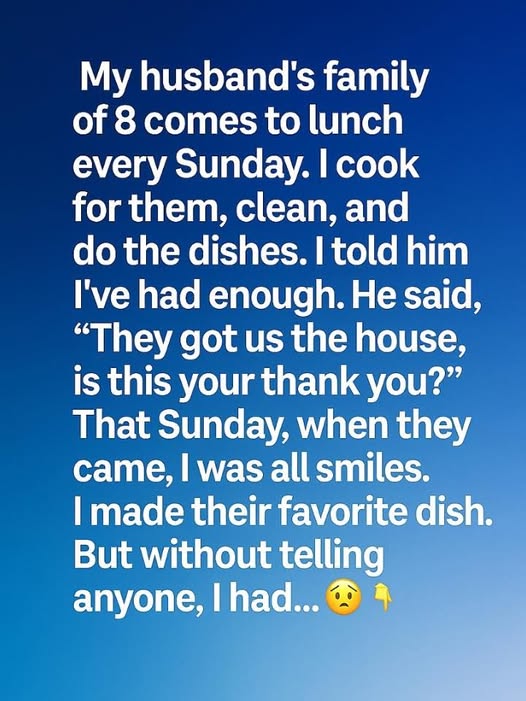“They helped us get this house,” he said. “Can’t you at least thank them properly?”
Thank them properly. Those words hit with the force of a slap. All those hours I’d spent sweating over boiling pots? All the cleaning, arranging, the desperate attempt to make everything perfect — that wasn’t gratitude enough? I didn’t scream. I didn’t argue. I simply shut my mouth, swallowed the bitterness, and made a decision.
If he couldn’t see the weight I carried, then I’d show him.
The next Sunday, I got up early, but instead of diving into the usual chaos, I walked into the kitchen with a lightness I hadn’t felt in years. The night before, I had arranged for a caterer to deliver enough food to feed my demanding crowd. Beautiful roast chicken, buttery mashed potatoes, crisp vegetables, warm bread, and a gorgeous pie for dessert. Everything arrived perfectly seasoned, perfectly packaged.
I plated it all like I’d made it myself. I set the table with the same care as always. I brewed fresh coffee, opened the curtains, and waited.
No stress. No sweat. No aching muscles. For once, I sat down before they arrived.
When his family walked in, the smell hit them immediately. They showered me with compliments before they even took off their shoes. “Something smells amazing!” “You outdid yourself this week!” “This is incredible!”
And there I was — calm, rested, smiling — watching them devour food I didn’t cook, praising the “effort” I didn’t make, acting like this was my shining culinary masterpiece.
Not one person questioned how relaxed I looked. No one considered the possibility that the meal came from anywhere but my kitchen. They simply ate, talked, laughed, and assumed I had somehow magically become Superwoman overnight.
My husband leaned over during dessert and whispered, impressed, “I think this might be your best one yet.”
I smiled without even glancing at him. “I’m glad you liked it.”
Hours later, after the last goodbye, after the front door finally closed, he wandered into the kitchen and froze. The catering containers, tucked inside the trash bin, were sitting right on top. His head snapped toward me, confusion pulling at his face.
“You didn’t cook today?”
“No,” I said, calm as ever. “And look — everyone survived. More than survived. They loved it.”
He didn’t know what to say. And for the first time in months, he actually looked at me — really saw me — without the fog of assumption and entitlement clouding his vision.
“I wasn’t trying to embarrass you,” I told him. “I just wanted you to understand that what I do every Sunday isn’t effortless. And it isn’t owed.”
He didn’t argue. He didn’t defend himself. He stood there silent, letting the truth settle — heavy, undeniable.
And something shifted.
It didn’t change him overnight. Real change rarely works that way. But the following Sunday, before I even mentioned anything, he asked, “What should we make this week?”
Not “What are you making?”
Not “What’s on the menu?”
But we.
He chopped vegetables. He washed dishes. He set the table. And when his family arrived, he told them to put their dishes on the counter — because yes, he had asked each of them to bring something. Nobody complained. If anything, they seemed relieved, almost happy to contribute.
Turns out they weren’t expecting me to carry it all. They simply assumed I enjoyed doing it because I had never said otherwise, never broken the pattern, never shown the strain. I had been silently drowning, and they mistook the silence for satisfaction.
That’s when the guilt hit — not mine, theirs. They apologized, slowly and in their own awkward ways, by offering to help, by cleaning up after meals, by bringing dessert or drinks or extra side dishes. My home stopped feeling like a buffet hall and became a gathering place again — warm, fair, balanced.
As for my husband, he learned something essential: appreciation isn’t saying “thank you” after you’ve eaten half a pie. Respect is stepping up without being asked. Gratitude means doing your part, not cheering from the couch while someone else carries the burden.
He learned that help isn’t a favor — it’s participation.
That rest isn’t laziness — it’s necessity.
That marriage isn’t a service agreement — it’s a partnership.
And I learned something too.
Sometimes words aren’t enough. Sometimes people don’t hear the quiet pleas buried underneath routine. Sometimes the only way to make someone understand your worth is to step back and let them experience the world without your invisible labor holding it up.
A single catered meal did what months of exhaustion and polite honesty couldn’t: it showed him what he had overlooked, and what he had taken for granted.
Now, every Sunday feels lighter. Easier. Fair.
The laughter is real again. My energy has returned. My marriage feels less like servitude and more like teamwork.
All because I stopped carrying everything alone — and allowed the silence to do the talking.
Sometimes the softest rebellion creates the strongest change.

